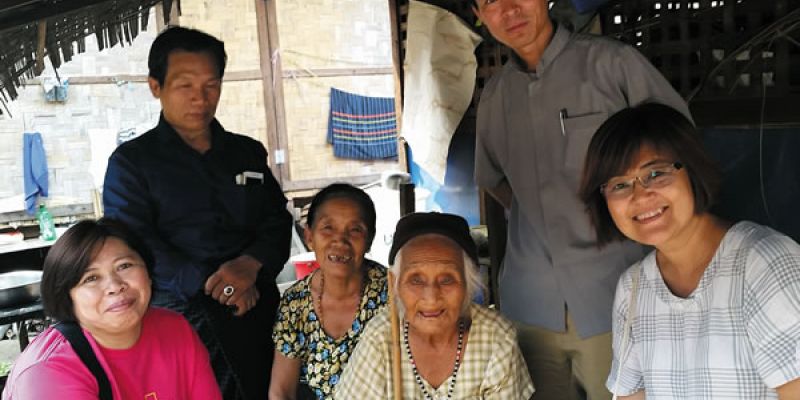
Unconquerable and Enduring
Anniversaries frequently have symbols associated with them like silver for 25 and gold for 50. Mindful that this year Columban missionaries celebrate 100 years of witnessing God's love through our relationships with people, especially those who are vulnerable and with the wounded Earth, I was curious what might represent an anniversary of 100 years. A quick internet search largely revealed that there is no symbol for 100 years presumably because it is a rare enough event that no symbol is necessary. However, one comment did assign the diamond stating that:

Diamond means unconquerable and enduring. Many people believe that the fire in the diamond symbolizes the constant flame of love.
It occurs to me also that diamonds are a stone known for their stunning and even blinding refractions of light. These images of fire and light that reflect a constant love seem most appropriate as we celebrate 100 years of Columban mission and look for illumination to the future.
It is fair to say that love was the spark that enflamed the hearts of our founders. One of my favorite quotes about Columbans in the early years comes from a book written by Fr. James McCaslin called, The Spirituality of Our Founders. He writes in a section titled "Love and Service to the Poor."
This option on favor of the poor was in no way limited to this or that Columban. The cry of the poor has been in Columban ears constantly from the beginning … They were acutely aware of the massive structural injustice….they could not change unjust structures, but they did their best to alleviate the misery of the victims. For the love of God.
Today this constant flame of love can be seen among other things, in the Columban commitment to justice, peace, and the integrity of creation (JPIC). Identified as a formal ministry in 1976, Columbans have included work for structural change as an integral part of our missionary endeavor for more than 40 years. In the light of Vatican II which opened the window for JPIC, Columbans were affirmed in what we knew from the beginning, that poverty, oppression, violence, and exploitation were interconnected and structural. We began to see more clearly and articulate more loudly our insights that the realities we experienced across the globe of living with the economically poor and the wounded Earth were linked to national and international economic, social, and environmental policies.
As such, we hold in our Constitutions that being Columban means:
Striving to have the Kingdom of God permeate the lives and cultures of all peoples, we proclaim the universal message of salvation through witness, ministry, and dialogue from the standpoint of solidarity with the poor…It means supporting the struggle of the poor for real participation and against injustice… to thirst for God's justice and [be] peacemakers enamored of true Godgiven community.
Moving beyond the pages of theory – Columban JPIC is flesh and bone, heart and soul, hands and feet. Our commitments to issues like migration, climate change, peace, and inter-religious dialogue are because behind each issue there is a person, countless people with names, faces, and families that are marginalized economically, socially, politically, and/or religiously. There is the natural world that has been wounded especially because of human overconsumption. Joining with national and international networks like Global Catholic Climate Movement and Pax Christi International, Columbans are helping to shape and implement Catholic Social Teaching through encyclical's like Laudato Si', and the Catholic Nonviolent Initiative. We lend our voices to dialogues happening in national governments and international institutions like the United Nations. We strive to be links between local realities and structural change. We invite people to learn about JPIC through experiential educational opportunities like our advocacy internship in Washington, D.C., short term volunteer service and mission exposure experiences to the US-Mexico Border and other countries around the world.
Let me share with you my most recent experience of encountering Columbans' constant love for the poor and the wounded Earth. I was visiting our mission in Myanmar where Columbans have recently formally returned after about 35 years of exile. One of the pressing concerns in the country is the conflict between ethnic minorities and the Burmese majority. Columbans both historically and contemporarily find ourselves concentrated in the Kachin State where much of the country's most intense fighting plays out. One of the consequences of this internal war is the internal displacement of thousands of people from their land and homes and into Internally Displaced Persons (IDP) camps.
I had the opportunity to visit several IDP camps while in Myanmar. The conditions were heartbreaking with entire families living in one 12x12 bamboo room with no running water, limited electricity, poor health and sanitary conditions, and only limited access to education. I was inspired to see that Columbans, the dioceses, and international Catholic aid agencies were all working together and trying to respond to this reality in some way or another through things like resources, education and pastoral accompaniment.
Pope Francis in his encyclical Laudato Si' invites us to hear the cry of the poor and the cry of the earth. Columbans find ourselves listening to those cries every day. While in one camp, one man shared with me his longing to return to his village so that his children would know the land of their roots and to be able to live peacefully as their ancestors have done for generations. In another camp, when word was out that Columbans were visiting, one woman aged 98 years came quickly to greet us. She was affectionately called, Adwi Gungai, or Grandmother. With warmth and emotion, she spoke of knowing the first Columbans who arrived in Myanmar in the early 1930s. She would have been a young girl at the time, and it was clear that she had carried a constant love for Columbans all her life – happy to be reunited after decades of separation.
It is easy to be inspired by these encounters with people who carry in their hearts sparks of love, light and hope for the future that shine as St. Paul wrote in his letter to the Corinthians:
Now the Lord is the Spirit and where the Spirit of the Lord is, there is freedom.
All of us, gazing with unveiled face on the glory of the Lord, are being transformed into the same image from glory to glory, as from the Lord who is the Spirit. For God who said, "Let light shine out of darkness, has shone in our hearts to bring to light the knowledge of the glory of God on the face of Jesus Christ." (2Cor 3:17- 18; 4:6)
Adwi Gungai was a living witness to the constant flame of love that Columbans have tried to live for the last century. As we look forward towards the next century, may Adwi Gungai be a reminder to us all of our hearts burning to be in relationship with each other and especially the wounded world. May the diamond of today be our fire for tomorrow.
Amy Woolam Echeverria is the international JPIC coordinator for the Missionary Society of St. Columban.


 The Columbans are a society of missionaries, including priests and lay people, who minister to people of various cultures as a way of witnessing to the universal love of God.
The Columbans are a society of missionaries, including priests and lay people, who minister to people of various cultures as a way of witnessing to the universal love of God.